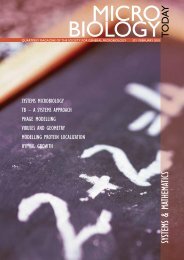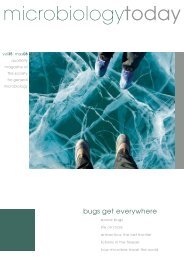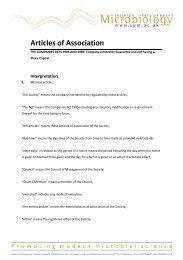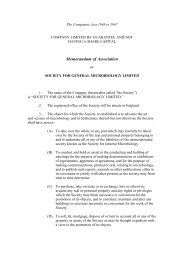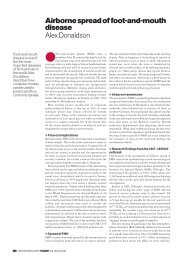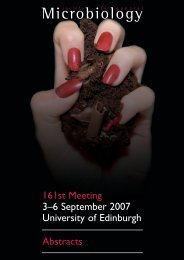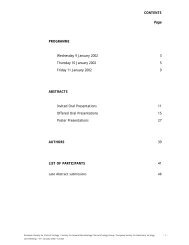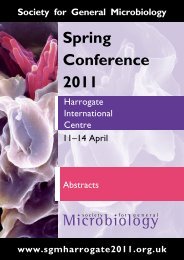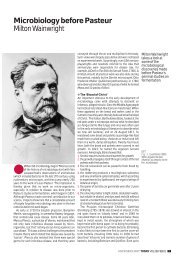Download - Society for General Microbiology
Download - Society for General Microbiology
Download - Society for General Microbiology
Create successful ePaper yourself
Turn your PDF publications into a flip-book with our unique Google optimized e-Paper software.
e difficult to explain to the public in<br />
some cases, but big fancy words do not<br />
help science communication’, said Dr<br />
Ernest Asilonu from Genzyme Ltd.<br />
If you are asked to comment on<br />
somebody else’s research, or on an<br />
emerging news story, the key is speed.<br />
Journalists work to exceptionally<br />
tight deadlines and will usually need<br />
feedback within minutes rather than<br />
days. They are often after ‘soundbites’,<br />
short quotes that can be added to a<br />
story to give it a different perspective.<br />
At the SGM we get lots of calls from<br />
reporters asking to be put in touch<br />
with an expert. When this happens,<br />
I search our experts database to find<br />
people who are happy to speak to<br />
the media. As an SGM expert, there<br />
are plenty of opportunities <strong>for</strong> you<br />
to get involved with microbiology<br />
in the media. We publicize research<br />
presented at our meetings, as well<br />
as findings published in our four<br />
journals. We produce two podcasts,<br />
Micropod and Microbe Talk, which<br />
include interviews with specialists<br />
on a diverse range of topics, from<br />
astrobiology to STIs. And finally,<br />
there are opportunities to respond<br />
to consultations and review books.<br />
If you would like to be added to<br />
our database, or would like more<br />
in<strong>for</strong>mation, please email press@sgm.<br />
ac.uk<br />
The training included tips on how to<br />
write a news story, in<strong>for</strong>mation about<br />
how newspapers work, what to wear<br />
on TV and even some practice radio<br />
interviews. The participants found<br />
the day very helpful and are already<br />
making use of what they learnt. Dr<br />
Mike Dempsey from Manchester<br />
Metropolitan University is using the<br />
techniques <strong>for</strong> writing abstracts. ‘The<br />
main message I took from the training<br />
was to make sure the key point is in<br />
the first sentence.’ This is also a great<br />
help <strong>for</strong> press officers, who look <strong>for</strong><br />
potential stories by searching through<br />
abstracts.<br />
Clinical scientist Dr Siobhan O’Shea<br />
from St Thomas’ Hospital Trust said,<br />
New media update<br />
Microbe Talk – www.sgm.ac.uk/news/poscast.cfm<br />
In the September episode Dr Louis Magnarelli, Director of The Connecticut<br />
Agricultural Experiment Station in the USA, talks to us about diagnosing<br />
West Nile virus.<br />
A new test <strong>for</strong> West Nile virus in horses that could be modified <strong>for</strong> use with<br />
humans and wildlife may help track the spread of the disease, according to<br />
an article in the September issue of the Journal of Medical <strong>Microbiology</strong>.<br />
New launch <strong>for</strong> micropod –<br />
www.micropodonline.com/podcast.html<br />
Episode 10 has arrived! This month we have a special bumper launch edition<br />
of micropod <strong>for</strong> you. Not only do we have a fabulous new jingle, but we’re<br />
also twice the length of the normal podcast! But don’t worry, it’s not just<br />
twice as much Lucy and Lucy, it’s more interviews, news and two topics....<br />
yes TWO topics!<br />
We’re talking (and listening to) music with an interview with Dr Carl Winter<br />
and his amazing food safety songs.<br />
We also talk about genetic modification, Lucy G interviews Dr John Heritage<br />
and finds out exactly what GM means. Then Lucy H has a chat with Professor<br />
Nigel Poole about the media and GM and his experiences of getting<br />
genetically modified tomatoes onto supermarket shelves.<br />
SGM now has groups on Facebook and MySpace!<br />
Join in <strong>for</strong> news about the <strong>Society</strong> and event updates, as well as discussions<br />
and interesting microbiology stories!<br />
Facebook page – www.new.facebook.com/groups/create.php?customize<br />
&gid=27768262231#/group.php?gid=27768262231<br />
MySpace page – http://groups.myspace.com/SocGenMicro<br />
‘the main message <strong>for</strong> me was that<br />
dealing with the media does not have to<br />
be ‘scary’ and instead of avoiding it we<br />
should be more ready to embrace it as<br />
a means of getting science out there to<br />
the public. At the end of the training I<br />
felt significantly more confident in terms<br />
of dealing with the media. As scientists,<br />
we are trained to write and give<br />
presentations in a particular style which<br />
is not appropriate outside the confines<br />
of our scientific environment. In terms<br />
of the future, the knowledge gained<br />
from the training has given me the skills,<br />
I hope, to interact more confidently and<br />
positively with the media.’<br />
Professor Martin Cranage from St<br />
George’s, University of London said,<br />
‘the media training day was great<br />
and I guess the main point that I took<br />
home was get your message over<br />
cogently even if it means responding to<br />
an oblique question with the answer<br />
that you want to give rather than<br />
where the interviewer may be trying<br />
to take you. The knowledge gained<br />
from the training has definitely<br />
increased my confidence in engaging<br />
with the media.’<br />
SGM will be running media training<br />
events annually, so if you would<br />
like to be invited to the next one,<br />
please email Lucy at l.goodchild@<br />
sgm.ac.uk<br />
SGM likes to encourage the personal<br />
developments of early career microbiologists. By<br />
supporting the activities of Sense about Science,<br />
our members can attend their workshops. Sarah<br />
Maddocks went on one.<br />
Standing up <strong>for</strong> Science<br />
media workshop<br />
Sense about Science, a charitable trust that counters misrepresentation of science<br />
in the media (www.senseaboutscience.org.uk), recently ran a workshop aimed at<br />
early career scientists inviting them to Stand up <strong>for</strong> Science. Co-ordinated by the<br />
Voice of Young Science network (VoYS), this workshop introduced PhD students<br />
and postdocs from a range of disciplines, to the media and confronted the related<br />
issues facing scientists today.<br />
Held at the Institute of Biology headquarters in London, the workshop began by<br />
introducing Science and the Media. Groups of participants discussed the changing<br />
roles and image of science and scientists in the public domain. Case studies<br />
where science had been misrepresented were offered and discussed with a panel<br />
of scientists who were experts in their field, with prior experience of media<br />
interaction.<br />
Then science in the media was covered from a reporter’s point of view with<br />
lively debate from a panel of journalists (Daily Mirror, BBC radio and The Times).<br />
The panel explained how they approach scientific stories and the importance of<br />
balancing news and entertainment with conveying science. This made participants<br />
appreciate the importance of good communication between the scientific<br />
community and the media.<br />
The day rounded off with a ‘nuts and bolts’ discussion in which members of the<br />
VoYS offered practical advice on getting your voice heard in scientific debates<br />
including the difficulties involved, areas of misunderstanding and ensuring that<br />
‘good’ science is communicated to the public.<br />
Having no prior involvement with the media and viewing it with some pessimism,<br />
the Sense about Science workshop has helped me to develop a more in<strong>for</strong>med<br />
attitude. I appreciate the importance of the media in conveying science to<br />
the public and the role that scientists can play in this to ensure that accurate<br />
in<strong>for</strong>mation is published. This workshop would be advantageous <strong>for</strong> all scientific<br />
researchers, regardless of their experience, who want to stand up <strong>for</strong> science and<br />
eliminate its misrepresentation.<br />
Sarah Maddocks, University of Bristol<br />
AbleStock.com / Jupiter<br />
216 microbiology today nov 08 microbiology today nov 08 217



